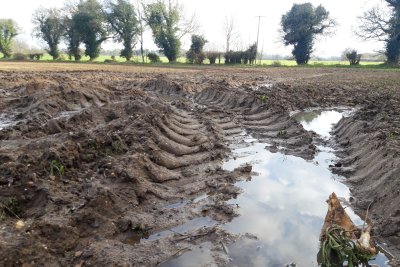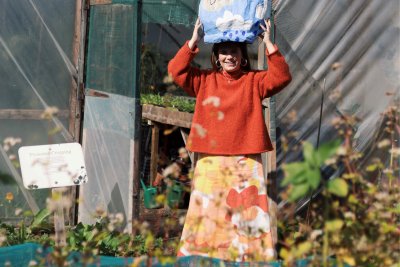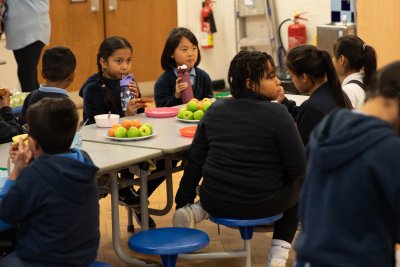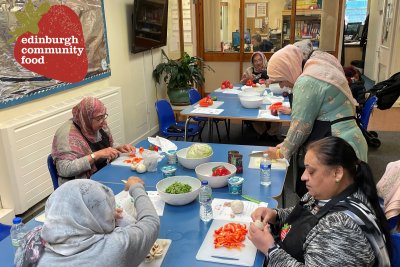Blogs • Sustainable Farming Campaign
MPs champion our calls to invest in local food infrastructure
Last week, a well-attended Westminster Hall debate full of rich discussion from across political parties and front benches, agreed the motion to support local food infrastructure. Hosted by Peter Aldous, MP for Waveney, there was a strong turnout from across the political parties and across the UK, all of whom strongly showed their interest in supporting better and fairer to routes to market for UK farmers. Sustain and our alliance will seek to build on this momentum to secure greater support for local food systems across Parliament.
A transcript of the debate is available on Hansard. What did MPs call for at the debate?
- A Local Food Fund, carved out of the Levelling Up budget, to help establish new infrastructure and enterprise across the country.
- The speedy roll out of dynamic procurement systems at both the national and the local Government levels.
- A commitment to a food partnership in every local authority across all the UK nations.
- Maintain and enhance the Groceries Code Adjudicator to tackle unfairness which is rife in the larger retail supply chain and roll out of new supply chain sector codes.
- More cohesive and cross-Government effort to grow local food systems.
These are all asks which Sustain is championing through it’s work such as The Case for Local Food, Beyond the Farmgate, and a Tale of Two Counties, and in was set out in our briefing.
Debate summary
Watch the debate in full from 13:50
The Government’s Levelling Up programme presents a clear-cut opportunity to invest in local food infrastructure and partnerships. The house agreed with the debate motion that local food infrastructure support was Levelling Up in its truest sense, from providing jobs and building wealth in communities to restoring pride in place and delivering wider environmental and social outcomes.
In his opening speech, Peter Aldous MP highlighted the work that Sustain has done which “confirms that local food systems provide better environmental, economic and social returns.” Mr Aldous made an important point that “while this debate is focused on the long-term structural improvements that are needed to local food infrastructure, it is necessary to highlight the enormous pressures that are currently impacting on all aspects of food production.” He then made a clear call to Government that “if policy promotes the development of greater local supply, with the necessary supporting infrastructure, then we can embed greater resilience.”
Key quotes from the debate
Peter Aldous, MP for Waveney: “Sustain also proposes that the UK Government should use the existing budgets and pots of funding—such as the UK shared prosperity fund and the community ownership fund—to create a £300 million to £500 million local food investment fund to provide strategic support across the UK for investment in localised agrifood infrastructure and enterprise.”
Olivia Blake, MP for Sheffield Hallam: “We need investment to plug the gaps in local supply chains, to strengthen them, and to expand their capacity. We also need to fund advice and mentoring for farmers on business planning and sustainable farming methods”. “According to Sustain, every £10 spent on a local box scheme results in total spending of £25 in the local area, compared with just £14 when the same amount is spent in a supermarket. Changing food procurement guidelines and processes—making them more flexible to support local food suppliers—will be crucial for keeping money locally.”
Jo Gideon, MP for Stoke-on-Trent Central: “To provide a holistic solution, we need a food taskforce across multiple Departments and a good food Bill to enshrine reforms in law”. “Only communities can build a strong and sustainable local food infrastructure. However, Government can help in a number of ways, from setting procurement standards, which ensures that more locally sourced produce is supplied to our public sector, to incentivising urban growing and new community food enterprises or investing in projects relating to diet and public health that promote good food choices.”
Anthony Mangnall, MP for Totnes: “The Crown Commercial Service committed to introducing a dynamic purchasing system to allow SMEs to register for Government contracts. In 2016, that was successfully piloted in Bath and north-east Somerset. The pilot demonstrated that food costs did not increase when buying from local SMEs, and it generated cost savings of 6% in the first year due to increased transparency and shorter supply chains.”
Diedre Brock, MP for Edinburgh North and Leith: “One of Sustain’s recommendations is for all local authorities that do not have a food partnership to aim to start one, in collaboration with the Sustainable Food Places Network, by 2025. Scottish councils are well represented in that network; half of all our local authorities now have a food partnership and are members of Sustainable Food Places—with more to follow in the next few years.”
Daniel Zeichner, MP for Cambridge and Shadow Farming Minister: “I would like to pick up on some of the points made about local abattoirs. For instance, when one talks to people who want to return to mixed farming, it becomes pretty clear that it is very hard to do so without the local ability to raise livestock in the way those people would like. Sadly, I see from reading this week’s Farmers Guardian that another one has just gone—Glossop-based Mettrick’s.”
Mark Spencer, Minister of State for Defra, showed his support for local food and UK farmers in his response to the debate. In his speech, he said “the Government are focused on helping these [SME] businesses grow, including through exporting, selling direct to consumers, accessing public sector procurement opportunities, and promoting their products at a regional level. That point goes right to the heart of the debate and the point made by my hon. Friend the Member for Waveney. Clearly, the infrastructure required to support that is vital”.
On hospitality and tourism, Mr Spencer explained “street food venues will be encouraged to connect with local food producers and reduce food miles and waste, boost employment, and grow local economies”.
On fairness within the supply chain and the role of the Groceries Code Adjudicator, Mr Spencer commented that “the Government want all farmers to get a fair price for their products and we are committed to tackling contractual unfairness in the agrifood supply chain. There is a lot of debate about the Groceries Code Adjudicator—I sat on the original Bill that introduced it—but it has had an impact in making sure those in the retail sector conduct themselves in the right way”. Mr Spencer concluded by saying “we will continue to engage with the industry to develop strong local food infrastructure.”
We would like to thank Peter for his support and dedication to securing the debate and making a passionate plea for more support for local food. We also thank all the MPs and the Minister who attended and spoke in great favour, as well as those who wanted to participate but could not for various reasons.
Published Monday 12 September 2022
Sustainable Farming Campaign: Sustain encourages integration of sustainable food and farming into local, regional and national government policies.





